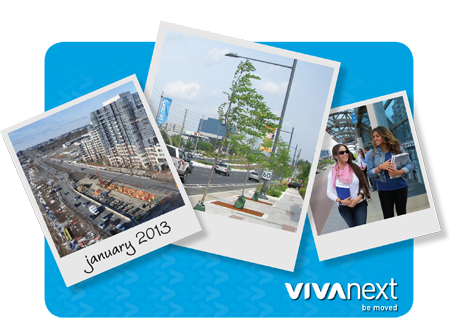Street lights are one of those infrastructure elements that the public may not give a lot of thought to, but in truth their design contributes significantly to the overall streetscape. And because the vivaNext project is being used to transform Highway 7 East from a highway to an urban corridor, all the design components, including the street lights, have been given a lot of thought. But before design considerations can be focused on, safety is the first priority to be achieved with street lighting. VivaNext works with York Region, the local Municipality and the utility companies to develop lighting designs, coordinate and install the lights. Here’s an overview of the role lighting plays in the vivaNext vision, and the street lighting elements you will see installed on all the rapidway corridors.
Designing street lighting, like all the major elements in the vivaNext project, focuses on achieving a combination of practical and design objectives. Lighting is first and foremost a public safety consideration. There are strict national and local standards on how street lighting is designed, including how much lighting is required for different conditions. For example, different measures are used to determine the lighting levels for roadways compared to intersections and sidewalks. Once the levels are known, lighting designers develop a design, which includes variables such as pole height, spacing and “lux,” which is the amount of light to be provided by the fixture.
Once the lighting design is done, streetscape design objectives can come into play in order to marry the technical requirements with the architectural priorities needed to achieve the desired streetscape “look.” In the case of vivaNext, the streetscape objectives are for a modern, stylish and uncluttered look that will contribute to the corridors feeling like urban destinations, and make them distinctive from other Regional roadways.
To achieve all these safety requirements and design objectives, we have selected a special street light pole and luminaire [the light head or fixture], and arm that holds the luminaire, to be used along the Highway 7 rapidway segments. The poles will be a little higher than the ones they’ve replaced [9.9 metres high versus 8.0 metres], and they’re made of metal with a dark grey powder-coat finish for long-wear and less maintenance. Unlike most poles which are octagonal shaped and tapered to the top, these are round and cylindrical for a sleeker, more modern look. And the lighting head or luminaire on top was chosen to complement the sleek, modern look of our canopies.
The street lights also have a photo sensor to automatically turn on and off when it’s dark. And the bulbs – which are little larger than the light bulbs you have in your home – only need to be replaced every 4 years.
So next time you’re sitting at a stop light or at a bus stop and you’re looking at the beautiful new streetscape, you’ll know more about all the decisions that were needed to turn on the lights! Enjoy!!

